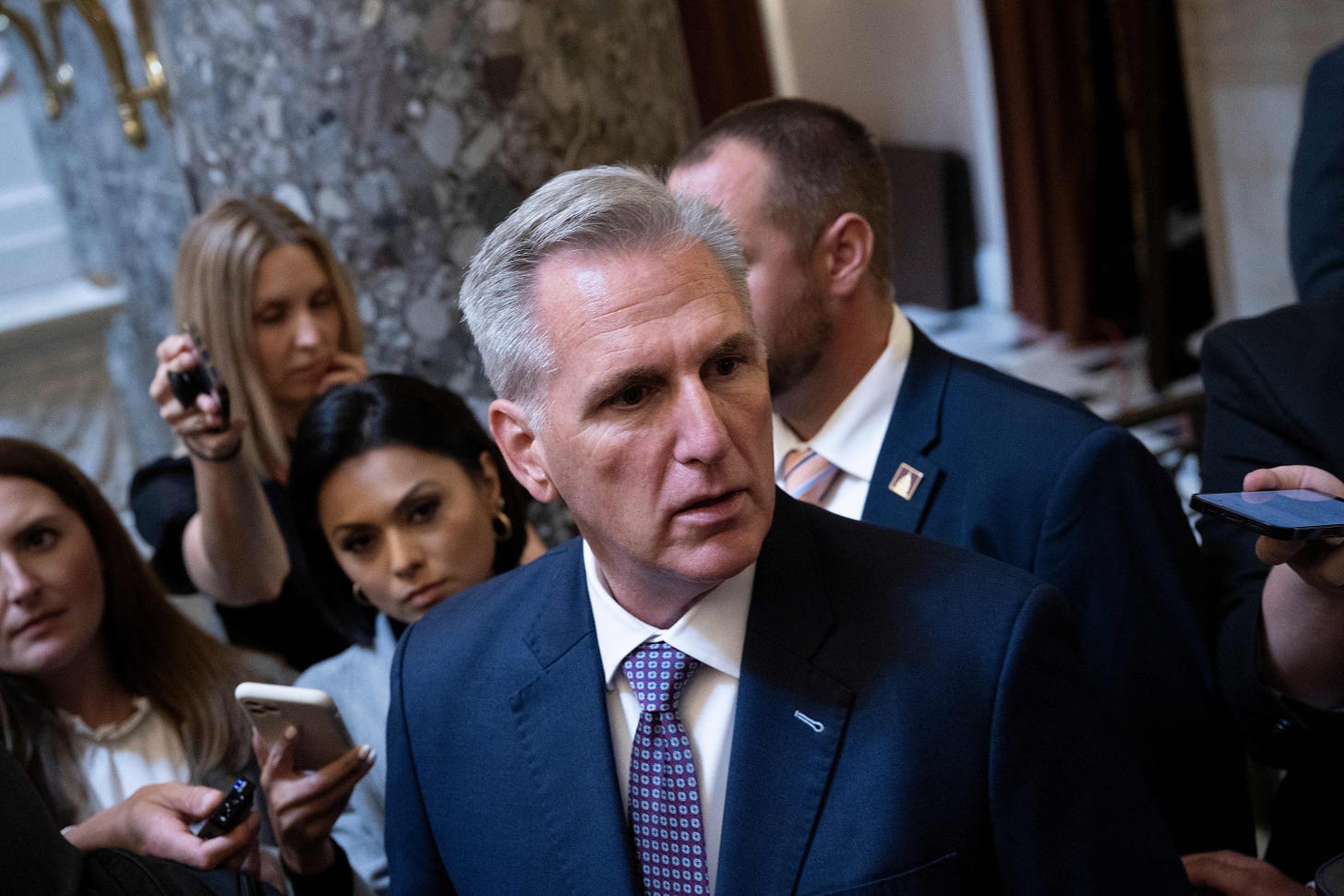Kevin McCarthy’s Sham Impeachment
The same Republicans who worked to undermine the legitimate impeachments of Donald Trump are now cooking up a bogus one for Joe Biden.

ON SEPTEMBER 12, House Speaker Kevin McCarthy told reporters, “I am directing our House committee to open a formal impeachment inquiry into President Joe Biden” regarding “allegations of abuse of power, obstruction, and corruption,” as well as the president’s purported “knowledge of his family’s foreign business dealings.” Citing zero evidence of specific wrongdoing by Joe Biden or his son, Hunter Biden, McCarthy emphasized that “an impeachment inquiry is the ability to get the information to answer the questions. That’s all we’re doing.”
Setting aside the lack of facts, McCarthy’s announcement was a political snoozer for the simple reason that Americans are cynical of, and exhausted by, impeachment talk. After two failed impeachment trials of former President Donald Trump (the first for asking Ukraine to announce an investigation into Joe Biden, the second for inciting the January 6th insurrection), which were preceded two decades earlier by the failed impeachment trial of former President Bill Clinton (for lying under oath about his affair with White House intern Monica Lewinsky), we all know that the Constitution’s impeachment clause has become meaningless as a check on abuses of presidential power.
But it’s still in the text of Article II. So as a matter of law, it’s worth observing how brazen and ridiculous McCarthy’s maneuver is.
Here are four ways in which the impeachment process initiated by McCarthy breaks with precedent—and adds to the devaluing of this constitutional safeguard.
1. The inquiry has nothing to do with Biden’s conduct as president.
McCarthy’s probe seems to assume that Biden, while serving as vice president during the Obama administration, may have leveraged his clout to help his son’s professional endeavors. However, as constitutional scholar Cass Sunstein wrote in a 1998 law review essay, “the principal goal of the Impeachment Clause” is to address “a narrow category of egregious or large-scale abuses of authority that comes from the exercise of distinctly presidential powers.” Pre-presidential conduct is to be addressed, if anywhere, in the civil and criminal justice systems, not under the impeachment clause, which is expressly designed for “Treason, Bribery, or other high Crimes and Misdemeanors.” Although the latter phrase is undefined in the Constitution, in 1788 Alexander Hamilton wrote of the impeachment process in Federalist Paper No. 65: “The subjects of its jurisdiction are those offenses which proceed from the misconduct of public men, or, in other words, from the abuse or violation of some public trust.” Hamilton’s statement stands to reason. No private person is covered by the language of the impeachment clause—only “the President, Vice President and all civil Officers of the United States.” As a matter of first principles, then, McCarthy’s inquiry makes no constitutional sense.
2. The voters elected Biden knowing that his son’s behavior has at times been problematic.
Hunter Biden’s seemingly shady business dealings were well known by the time voters went to the polls in November 2020. They were at the crux of Trump’s call to Ukrainian President Volodymyr Zelensky, made when it seemed apparent that Biden was Trump’s principal rival for the presidency. During Trump’s first impeachment, numerous Republican House members and Trump’s lawyers proclaimed, “Let the voters decide.” Well, they did. Biden won. To impeach Biden for conduct that preceded the election and was known to the public when the American people cast their ballots is hypocritical on the part of Republicans. Assuming that no shocking new evidence arises in connection with McCarthy’s inquiry, it’s arguably undemocratic, as well.
3. Prior impeachment inquiries were launched based on evidence, not the mere hope that evidence might be found.
Prior presidential impeachment processes began with some semblance of evidence.
For Trump’s first impeachment, the House of Representatives had a transcript of a phone call between the former president and Zelensky, in which Trump, while withholding congressionally appropriated aid that Ukraine needed to fend off a Russian attack, urged Zelensky “to do us a favor” and “find out” about Biden and his son.
Trump’s second impeachment followed on the heels of the January 6, 2021 insurrection at the U.S. Capitol. Trump had publicly pressured Vice President Mike Pence to reject the election results, which he falsely claimed were fraudulent, and told supporters to “fight like hell.” Rioters burst through barricades and stormed the Capitol; assaulted law enforcement officers; invaded, defecated, and urinated in the hallways and offices; and forced Pence and members of Congress to hide for their lives. Trump responded with a tweet that “Pence didn’t have the courage to do what should have been done to protect our Country and our Constitution.” The crowd erected gallows with a noose and chanted, “Hang Mike Pence.” Despite urging by multiple aides and family members that he call off the mob, Trump waited hours before addressing the crisis, contributing to multiple fatalities that day and beyond.
Bill Clinton’s impeachment came on the heels of a report to Congress and 18 boxes of supporting documents submitted by Independent Counsel Kenneth Starr, which outlined evidence of alleged perjury, obstruction of justice, and other related charges.
The Watergate impeachment proceedings of President Richard Nixon (which prompted his resignation before the full House voted on the drafted impeachment charges) began after aides G. Gordon Liddy and James McCord were convicted in court for their role in orchestrating the break-in; three other defendants pleaded guilty. Senior aides H.R. Haldeman, John Ehrlichman, and Attorney General Richard Kleindienst resigned. Attorney General Elliott Richardson appointed special prosecutor Archibald Cox a day after the Senate Watergate Committee began public hearings on the scandal and Nixon’s re-election campaign.
President Andrew Johnson was impeached when he violated the Tenure of Office Act of 1867—which had been enacted over Johnson’s veto—by removing Secretary of War Edwin Stanton from his cabinet. The law, which was later deemed invalid by the U.S. Supreme Court, provided that presidents could not dismiss appointed officials without the consent of Congress. Although Johnson’s impeachment was controversial, therefore, it began with a documented breach of existing law.
McCarthy has nothing of the kind in hand. As White House spokesman Ian Sams said of McCarthy’s claim that Congress needs to investigate, “House Republicans have been investigating the president for nine months and they’ve turned up no evidence of wrongdoing.”
As for Hunter Biden, the most that now-Special Counsel David Weiss could come up with are three gun-related charges, one of which the U.S. Court of Appeals for the Fifth Circuit separately ruled is unconstitutional. Hunter Biden’s story does not put matters remotely in the ballpark of a high crime or misdemeanor by Hunter’s dad, President Biden.
4. Prior speakers of the House of Representatives had enough votes from their own caucuses to open formal impeachment inquiries against their respective presidents. McCarthy does not.
Although the incendiary word “impeachment” was tossed around approximately five weeks earlier, former House Speaker Nancy Pelosi ultimately had the votes to open formal House inquiries into the Ukraine scandal. Trump’s January 6th impeachment began with formal articles of impeachment voted on by the House of Representatives. Reportedly, McCarthy lacks enough votes to open an inquiry on the House floor, despite having said previously that “if we move forward with an impeachment inquiry, it would occur through a vote on the floor of the People’s House and not through a declaration by one person.” The probe instead resides in the House Oversight Committee, led by Chairman James Comer (R-Ky.), with support from the Judiciary Committee and Ways and Means Committee.
If McCarthy were instead to just proceed with an ordinary (i.e., non-impeachment) congressional investigation, he would need a valid legislative purpose. As Chief Justice Earl Warren wrote in 1957 in Watkins v. United States, “there is no general authority to expose the private affairs of individuals without justification in terms of the functions of the Congress,” nor can the inquiry be “an end in itself . . . solely for the personal aggrandizement of the investigators or to ‘punish’ those investigated.” Hunter Biden’s alleged possession of a gun for eleven days while still a drug addict may not alone suffice.
Of course, impeachment is inherently political. McCarthy’s tenure as speaker is in a precarious position, with a government shutdown looming. People like Marjorie Taylor Greene (R-Ga.) have reportedly demanded investigations into Biden in exchange for a vote on a short-term spending bill. For regular Americans, these machinations are too in-the-weeds to warrant a side glance. But we must all keep our eyes on the big picture, and see clearly what these impeachment proceedings against Biden mean: that for congressional Republicans, the Constitution that they have sworn to support and defend—and the structure for American democracy it established some twenty-three decades ago—has come to mean nothing.






This is such an thoughtful and illuminating thread. Thanks all for reading my column! My point, in response to Random, is that it would be anti-democratic to impeach Biden based on pre-presidential innuendo relating to his troubled son, because it would deprive voters of their choice under the same set of (non) facts. If new evidence arose to justify an impeachment, hypothetically, that would be different. But that’s the case for any president.
Through all this it amazes me that the Constitution does not enable the people to withhold their paychecks and perks. It amazes me that it is always primary voters who get to "pick" these people as representatives for the rest of us and that both parties have rigged the primary's and district maps to the detriment of the people. It amazes me that once in office they spend more time protecting their seats than actually doing any serious work for the people and yet the people really have no recourse in any of it.